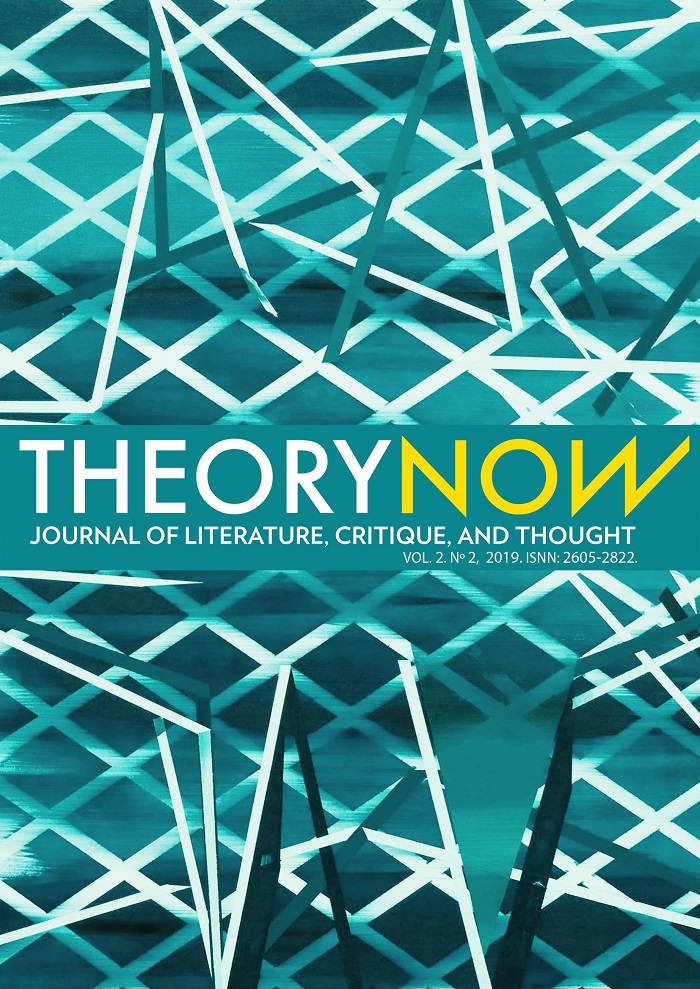The ‘Deadly Secret’ of the Prophecy: Performative and Parabolic Language in Chigozie Obioma’s The Fishermen
DOI:
https://doi.org/10.30827/tnj.v2i2.9510Keywords:
Prophecy, Speech act, Performative language, Secrecy, Figurative language, Parable.Abstract
In Chigozie Obioma’s novel, The Fishermen (2015), we witness the tragic events triggered by a prophecy delivered to four Nigerian brothers. My main aim in this essay is, following J. Hillis Miller’s analysis of speech acts in literature, and also ideas by Jacques Derrida and Derek Attridge, to develop an argument about this prophecy as a performative use of words that makes things happen in the world by way of its listeners and believers. The prophecy is presented as a speech act characterised by secrecy, obscurity and ambiguity, given the impossibility of subjecting its words to true and false verification and its undecidability in relation to the literal and the figurative uses of language. It is a speech act that requires an addressee that literally and naively believes in it, with Ikenna–the oldest brother–emerging as such a believer, who in this sense is just like his siblings, repeatedly presented as taking language at face value, unable to recognize its duplicitous and ambivalent nature. Because of this inability to perceive the parabolic or indirect dimension of language, the children establish a continuity between language and action, which leads them to act on reality led by words, in all cases with fatal consequences.
Downloads
References
Attridge, Derek. The Singularity of Literature. London, Routledge, 2004a.
___. J.M. Coetzee and the Ethics of Reading: Literature in the Event. Chicago, The University of Chicago Press, 2004b.
Austin, Blair. “An Interview with Chigozie Obioma”. Fiction Writers Review, 24 Oct 2016, https://fictionwritersreview.com/interview/an-interview-with-chigozie-obioma-2/. Accessed 20 March 2019.
Austin, J.L. How To Do Things With Words. Oxford, The Clarendon Press, 1962.
Blanchot, Maurice. The Unavowable Community. Translated by Pierre Joris, Barrytown, N.Y., Station Hill Press, 1988.
Calinescu, Matei. “Secrecy in Fiction: Textual and Intertextual Secrets in Hawthorne and Updike”. Poetics Today, 1994, vol. 15, no. 3, pp. 443-465.
Christidis, A.F. “Prophetic Discourse”. A History of Ancient Greek: From the Beginnings to Late Antiquity, edited by A.F. Christidis, Cambridge, CUP, 2007, pp. 1367-1376.
Derrida, Jacques. Given Time: I. Counterfeit Money. Translated by Peggy Kamuf, Chicago, Chicago UP, 1992.
___. On the Name. Edited by Thomas Dutoit, translated by David Wood, John P. Leavy, Jr., and Ian McLeod, Stanford, Stanford UP, 1995.
Eliot, George. Adam Bede. London, J.M. Dent, 1960.
Fallowes, Graham. “Power and Performativity: ‘Doing Things With Words’ in Kafka’s Der Prozeß”. Oxford German Studies, 2015, vol. 44, no. 2, pp. 199-225.
Go, Nathan. “Of Animal Metaphors and the British Legacy: An Interview with Chigozie Obioma”. Michigan Quaterly Review, 9 Apr 2015, https://sites.lsa.umich.edu/mqr/2015/04/of-animal-metaphors-and-the-british-legacy-an-interview-with-chigozie-obioma/. Accessed 20 March 2019.
Habila, Helon. “The Fishermen by Chigozie Obioma Review – Four Brothers and a Terrible Prophecy”. The Guardian, 13 Mar 2015, https://www.theguardian.com/books/2015/mar/13/the-fishermen-chigozie-obioma-review. Accessed 30 March 2019.
Kermode, Frank. The Genesis of Secrecy: On the Interpretation of Narrative. Harvard, Harvard UP, 1979.
Martín Salván, Paula. “Ideas of Community in Thomas Pynchon’s The Crying of Lot 49”. Pynchon Notes, 2009, vol. 56-57, pp. 74-86.
Miller, J. Hillis. Tropes, Parables, Performatives: Essays on Twentieth-Century Literature. New York, Harvester Wheatsheaf, 1990.
___. Ariadne’s Thread: Story Lines. Yale, Yale UP, 1992.
___. On Literature. London, Routledge, 2002a.
___. Speech Acts in Literature. Standford, Stanford UP, 2002b.
___. Literature as Conduct: Speech Acts in Henry James. New York, Fordham UP, 2005.
___. Reading for Our Time: Adam Bede and Middle March Revisited. Edinburgh, Edinburgh UP, 2012.
Nishimura, Satoshi. “Language, Violence, And Irrevocability: Speech Acts in Tess of the D'Urbervilles”. Studies in the Novel, vol. 37, no. 2, pp. 208-222.
Obioma, Chigozie. The Fishermen. London, Pushkin Press, 2015.
Rabinowitz, Nancy Sorkin. Greek Tragedy. Malden, Blackwell, 2008.
Rodríguez Salas, Gerardo. “Tasmania’s Cupboard: Indigenous and Convict Australia in Carmel Bird’s Writing”. Journal of Language, Literature and Culture, 2018, vol. 65, no. 3, pp. 169-186.
Salisbury, Joyce E. Encyclopedia of Women in the Ancient World. Santa Barbara, ABC-CLIO, 2001.
Shepherd, Gordon and Gary Shepherd. “Mormonism and the Family International: Toward a Theory of Prophecy in the Development of New Religious Movements”. Prophecy in the New Millenium: When Prophecies Persist, edited by Sarah Harvey and Suzanne Newcombe, London, Routledge, 2013, pp. 165-184.
Sides, Bradley. “Fate’s Brutality: The Millions Interviews Chigozie Obioma”, The Millions, 7 Jan. 2019, https://themillions.com/2019/01/fates-brutality-the-millions-interviews-chigozie-obioma.html. Accessed 16 April 2019.
Wallace, Jennifer. The Cambridge Introduction to Tragedy. Cambridge, CUP, 2007.
Downloads
Published
How to Cite
Issue
Section
License
Theory Now. Journal of Literature, Critique, and Thought is an immediate open-access publication which is available at no cost for readers and authors alike. Authors are not charged any kind of fee for the editorial processing of their articles. Reading, downloading, copying, distributing, printing, searching, linking or reusing all published articles for non-commercial uses is allowed on the condition of citing the author, the journal and the editing body. All intellectual material published in this journal is protected under a Creative Commons Attribution-NonCommercial 3.0 Spain license.
Dissemination of the articles in social (Facebook, Twitter, Linkedin, etc.) and scientific networks (ResearchGate, Academia.edu, etc.), public repositories at universities and other institutions, blogs, personal or institutional websites, Google Scholar, ORCID, ResearchID, ScopusID, etc. is strongly encouraged. In all cases, the intellectual property of the articles and any possible monetary profits derived from them belong exclusively to the authors.













